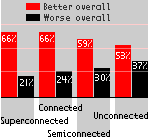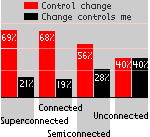Faith in the Future
Do you expect the quality of life for your children and the next generation of Americans to be much better, somewhat worse, or much worse than yours when they reach your age?

Agents
of Change
In
general, do you feel that you control change, or does change control you?

.
. . .
See
the full survey results
.
. . .
[an error occurred while processing this directive]
Meet the model citizens
To develop a profile of this rising group, Luntz researchers polled 1,444 randomly selected Americans and divided them into four categories based on how often they use email and the extent to which they have access to a laptop, a cell phone, a beeper, and a home computer. The "Superconnected" use email at least three days a week and use all four of the target technologies. The "Connected" also exchange email at least three days a week, but they have access to only three of the other four communication tools. The "Semiconnected" use at least one but not more than four of the technologies. Obviously, the "Unconnected" use none of these resources.By this methodology, the survey shows that Digital Citizens - Connected and Superconnected Americans - constitute 8.5 percent of the overall population. The survey also reveals that the more connected we are, the more democratic we are, the more likely we are to vote, the more we know about our political system, and the more faith we are likely to have in it.
Digital Citizens are extremely knowledgeable about the world around them. Compared with their Unconnected compatriots, Connected Americans are almost twice as likely to know that William Rehnquist is the chief justice of the United States. Likewise, while only 48 percent of Unconnected Americans could name the Speaker of the House of Representatives, 79 percent of the Connected properly identified him as Newt Gingrich. Remarkably, the Speaker enjoys even greater name recognition than several pop culture icons - only 62 percent of the Connected could come up with the first name of the TV character known as Seinfeld.
Despite the national lament that technology undermines literacy, Connected Americans are also more likely to spend time reading books than any other segment of the population broken down in this survey. Seventy percent of the Connected say they spend 1 to 10 hours reading a book during a typical week; another 16 percent read for 11 to 20 hours a week.
Far from being distracted by technology, Digital Citizens appear startlingly close to the Jeffersonian ideal - they are informed, outspoken, participatory, passionate about freedom, proud of their culture, and committed to the free nation in which it has evolved. An astounding 57 percent of Connected Americans have "a lot of confidence" in democracy, compared with 48 percent of the total population and only 42 percent of the Unconnected. The Connected are also more inclined to translate their views into political action - nearly 60 percent say they "always" vote in national, state, and local elections. Yet even if they brim with confidence in American ideals, the Connected are less enthralled with the institutions that carry them out. Although 46 percent of Connected Americans express "some confidence" in the two-party system, only 29 percent say they have "a lot of confidence" in it. In other areas - such as their level of confidence in the legal system, the courts, the police, the military, and US schools - Connected and Unconnected Americans are virtually indistinguishable.
These facts put the lie to much of contemporary political discourse and mainstream journalism, which together disseminate countless tales of perversion, porn, hatemongering, violence, addiction, and other perils that are said to flow from the online world. And while some of these dangers are real, the tales themselves are usually presented in such sensationalistic detail as to suggest that they are unavoidable realities of online life - rather than as the comparatively rare, though tragic, occurrences they actually are. More important, the common stereotype of the Internet as a haven for isolated geeks who are unaware of important events occurring outside their cavelike bedrooms can now be exploded as an inaccurate myth. The same goes for the caricature of technology as a civic virus that breeds disaffection from politics. If anything, the survey shows that political dissatisfaction does not stem from staring at computer screens, but from avoiding them.
The less connected
people are, the more ignorant of and alienated from politics they are likely
to be. In fact, the Unconnected are far more likely to embrace all the
negative attitudes toward politics so commonly attributed to the Connected.
Nevertheless, Digital Citizens have gotten a bad rap - denounced by moral
and intellectual guardians on both the left and right, reviled in contemporary
politics and culture, and assaulted by V-chips, the Communications Decency
Act, privacy-busting encryption rules, and other crude attempts at technological
regulation. To this day, the patriotic fervor of Digital Citizens has gone
unrequited. ![[next]](twoarrow_red.gif)
. . . .
Discuss the survey
with Jon Katz and other digital citizens, in Threads.
. . . .
Feedback | Help | About Us | Jobs | Advertise | Privacy Statement | Terms of Service
Copyright © 1994-2000 Wired Digital Inc., a Lycos Network site. All rights reserved.